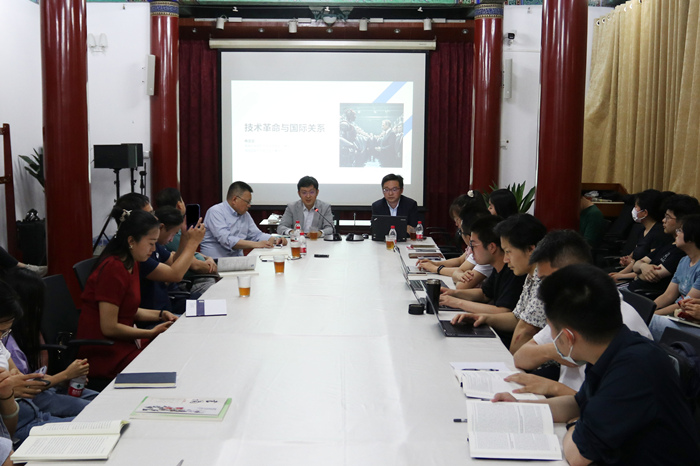On the night of May 18th, 2023, the Institute of International and Strategic Studies (IISS), Peking University (PKU) held the 62nd series of lectures of the "North Pavilion Seminar". Chen Dingding, Professor of the School of International Relations at Jinan University, delivered a lecture entitled "Technological Revolution and International Relations". This lecture was presided over by Gui Yongtao, Vice President of IISS, PKU and Vice President of School of International Studies, PKU.

Prof. Chen first introduced the current development trends of artificial intelligence (AI) from the perspective of the technical path, level of maturity, and application scenarios of the decision-making AI model, generative AI model and general-purpose AI model. He pointed out that the emergence of AIGC (Artificial Intelligence in Games and Computation) tools represented by ChatGPT marks the second leap in human productivity.
Further Prof. Chen analyzed the impact of AI on international relations. First, countries that completed the technological revolution earlier can quickly boost their economic and military power to provide strategic support for their country, while the changes in the balance of power can alter the global power structure and even stimulate the change in a country's foreign strategy. Second, AI may further widen the power gap between developed and developing countries, as well as change the macro geopolitical landscape. Third, AI technology may intensify the tech competition between China and the United States. Fourth, AI technology may affect international paradigms such as changing the connotation and form of wars, changing the infiltration methods and channels to public opinion wars, changing the construction path of global tech governance, and exacerbating the power extremism in international relations.
Finally, Prof. Chen pointed out that China, the United States, the European Union, Germany, the United Kingdom, France, Japan and other countries are competing to promote the development of AI, deploy R&D and application fields, and advance the formulation of AIGC rules. The technological competition between China and the U.S. will have a spillover effect on the development of AIGC, for example, the U.S.' bans on high-end chips exports to China and restrictions on Chinese investment will limit the computing power of AIGC technology of Chinese companies.
During the Q&A session, Prof. Chen had discussions and exchanges with the faculty and students attending the lecture on a series of topics, including the competitive relationship between China and the U.S. in AI R&D, the impact of AI on the existing international system and national forms, the value orientation of AI in the future, as well as network security and data security. (Contributed by: Ma Li'ao)
Editor: Li Fangqi

